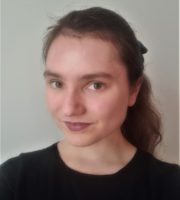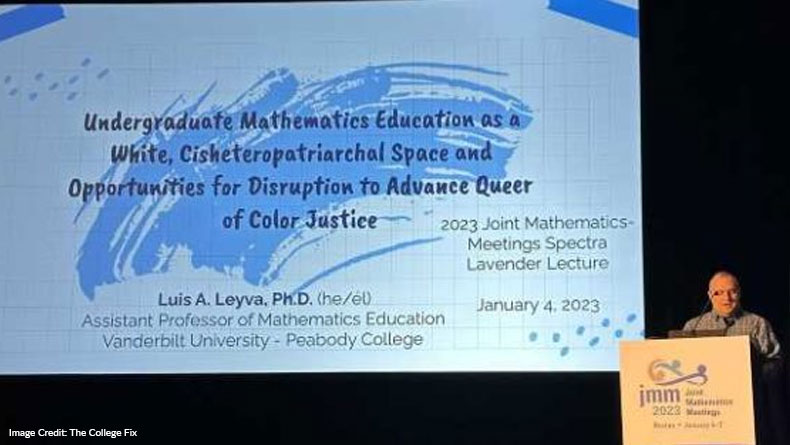‘Abstract reads like an over-the-top caricature,’ another professor told The College Fix.
By Chloe Ezzo – Dartmouth College [The College Fix] –
An education professor delivered a lecture in early January at a major mathematician meeting that described college math as “white” and “cisheteropatriarchal.”
“Undergraduate Mathematics Education as a White, Cisheteropatriarchal Space and Opportunities for Structural Disruption to Advance Queer of Color Justice” was the full title of the lecture given by Luis Leyva, associate professor of mathematics education at the Peabody College of Education and Human Development at Vanderbilt University.

Leyva delivered the lecture Jan. 4 in Boston at the Joint Mathematics Meetings 2023. The summit is the “largest mathematics gathering in the world,” according to its website.
“Cisheteropatriarchal” is a term in ethnic studies referring to “a system of male, straight, conforming-to-assigned sex system power,” teacher and curriculum designer R. Tolteka Cuauhtin told the Los Angeles Times in a 2019 article.
Leyva’s “findings depict[ed] how Black, Latin*, and Asian QT [queer and transgender] students’ narratives of experience reflect forms of intersectionality, or instances of oppression and resistance,” according to his lecture’s abstract.
Grateful to be distinguished with the opportunity to deliver the Spectra (@LGBTMath) Lavender Lecture at the 2023 @JointMath Mtgs in Boston tomorrow. I will deliver a lecture based on my research interrogating undergraduate math education as a white, cisheteropatriarchal space. https://t.co/JiaTe0B8zs
— Luis Antonio Leyva (he/him/él) (@LuisLeyvaEdu) January 3, 2023
The Fix left Leyva a voicemail asking for a comment or brief interview on the lecture via email or phone call. His email address was not publicly available. Leyva did not return the call.
Leyva’s research followed the “educational experiences of 39 undergraduate queer and trans* (QT) students of color pursuing STEM majors across historically white and minority-serving universities in the United States,” his abstract stated.
“I conclude by re-imagining undergraduate mathematics education with structural disruptions that advance justice for learners marginalized across intersections of race, gender, and sexuality,” the abstract added.
Leyva is also an affiliate in Vanderbilt’s Department of Gender & Sexuality Studies, according to his faculty bio. His work ”draws on critical race theory, women of color feminisms, and queer of color critique to conceptually and methodologically ground his scholarship, which centers historically marginalized voices in STEM higher education across intersections of race, gender, and sexuality.”
Leyva was named the 2022 LGBTQ+ Educator of the Year by Out to Innovate, a professional organization for LGBTQ+ people in STEM, Vanderbilt stated in a news release last May.

Leyva’s social justice pedagogy questioned by mathematician, Vanderbilt student
“[Leyva’s] abstract reads like an over-the-top caricature, another Sokal hoax,” Aryeh Kontorovich, a professor of computer science at Ben-Gurion University in Israel, told The Fix via email. “This one is all too real, I know.”
“It is my opinion as a computer scientist/mathematician and instructor with over 14 years of experience that politics and social justice have no place in math pedagogy,” Kontorovich said. “We can never all agree on what is just, while we can (hopefully) agree on what is mathematically correct, so math education should focus exclusively on the latter.”
Vanderbilt freshman Noah Jenkins also expressed concern.
“I fail to see, in any way, shape, or form, how collegiate math education in the status quo represents a system of ‘oppression and resistance,’ especially in a field that is so objective,” he told The Fix.
“Either you solve the equation properly, or you don’t. It really is that simple. It doesn’t matter if a gay person, a trans person, or whoever solves the problem, two plus two will always equal four.”

*Note: Article Republished on The Tennessee Conservative by express permission from The College Fix.

About the Author: College Fix contributor Chloe Ezzo is a student at Dartmouth College where she studies French and Russian. She is the President of the Dartmouth Republicans and several other conservative groups on campus.



One Response
Oh, didn’t bill lee do away with CRT/DIE?
Social Engineering at its worst